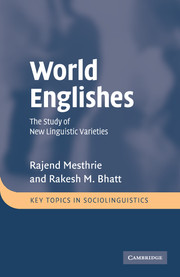Book contents
- Frontmatter
- Contents
- List of figures
- List of tables
- Preface
- Acknowledgements
- List of abbreviations
- 1 History: the spread of English
- 2 Structural features of New Englishes I: morphology and phrasal syntax
- 3 Structural features of New Englishes II: cross-clausal syntax and syntactic theory
- 4 More on structure: lexis and phonology
- 5 Pragmatics and discourse
- 6 Language contact and language acquisition issues in New English research
- 7 Conclusion: current trends in the spread of English
- Glossary
- Bibliography
- Author index
- Subject index
4 - More on structure: lexis and phonology
Published online by Cambridge University Press: 05 September 2012
- Frontmatter
- Contents
- List of figures
- List of tables
- Preface
- Acknowledgements
- List of abbreviations
- 1 History: the spread of English
- 2 Structural features of New Englishes I: morphology and phrasal syntax
- 3 Structural features of New Englishes II: cross-clausal syntax and syntactic theory
- 4 More on structure: lexis and phonology
- 5 Pragmatics and discourse
- 6 Language contact and language acquisition issues in New English research
- 7 Conclusion: current trends in the spread of English
- Glossary
- Bibliography
- Author index
- Subject index
Summary
In this chapter we continue to provide an overview of characteristics of New Englishes, chiefly in the realm of lexis and phonetics and phonology.
THE VOCABULARY OF NEW ENGLISHES
This section provides a brief overview of the characteristic lexis of New Englishes, chiefly in Africa and Asia. In a sense there is little difference between vocabulary generation in individual New Englishes and metropolitan Englishes: the same processes that create new lexical items in the latter are reported in New Englishes. The interest lies more in the details. Metropolitan Englishes have long been receptive to new lexis based on the colonial experiences of the English abroad. Terms like the following now pass as international English, rather than that of a specific colonial variety:
bandanna ‘large coloured handkerchief or neckerchief’ (from Hindi)
amok ‘rushing in a frenzy’ (from Malay)
tsetse ‘bloodsucking fly which transmits sleeping sickness’ (from Tswana)
zombie ‘corpse revived by witchcraft’ (from Kimbunda)
safari ‘expedition to hunt or observe animals’ (from Arabic via Swahili)
serendipity ‘lucky and happy outcome’ (based on the Persian fairytale of the Three Princes of Serendip, an old Middle Eastern name for Sri Lanka)
The above examples count as borrowings and reflect a process of acquiring new knowledge or artefacts from other cultures. By contrast, the words to be characterised in this section are not as widely known.
- Type
- Chapter
- Information
- World EnglishesThe Study of New Linguistic Varieties, pp. 109 - 130Publisher: Cambridge University PressPrint publication year: 2008



